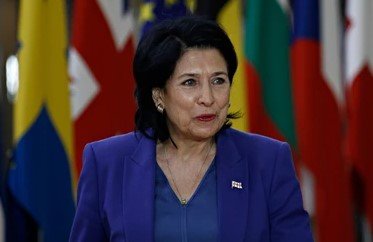In a solemn ceremony, President Salome Zurabishvili attended the civil funeral of Kesaria Abramidze, a prominent transgender model and public figure in Georgia. The funeral, held on September 22, 2024, at Vake Cemetery, was a poignant event that drew attention to the tragic circumstances surrounding Abramidze’s death. Abramidze, who was murdered on September 18, 2024, was remembered for her contributions to the LGBTQ+ community and her role as a trailblazer in Georgian society.
A Tragic Loss for the Community
The murder of Kesaria Abramidze has sent shockwaves through the Georgian community and beyond. Abramidze, aged 37, was a well-known figure who had made significant strides in advocating for transgender rights and visibility. Her untimely death has highlighted the ongoing challenges faced by the LGBTQ+ community in Georgia, particularly in the wake of recent anti-LGBTQ+ legislation.
President Zurabishvili’s presence at the funeral underscored the gravity of the situation and the need for societal change. In her remarks, she condemned the violence and called for greater protection and acceptance of LGBTQ+ individuals. The President’s attendance was seen as a powerful statement of solidarity and a call to action against hate crimes and discrimination.

The funeral was attended by numerous activists, friends, and supporters who gathered to honor Abramidze’s legacy. Many spoke of her courage, resilience, and the positive impact she had on their lives. The event served as a reminder of the importance of continuing the fight for equality and justice for all marginalized communities.
The Impact of Anti-LGBTQ+ Legislation
Abramidze’s murder occurred just one day after the Georgian parliament passed a controversial anti-LGBTQ+ bill. The legislation, which includes a ban on same-sex marriage and gender-affirming surgeries, has been widely criticized by human rights organizations and international observers. Critics argue that the bill has fueled an environment of intolerance and hostility towards the LGBTQ+ community.
The connection between the new law and Abramidze’s murder has been a focal point of public discourse. Many believe that the government’s promotion of the bill has emboldened transphobic sentiments and contributed to the violence. President Zurabishvili, who opposed the legislation, has called for a reevaluation of policies that perpetuate discrimination and harm.
The international community has also expressed concern over the situation in Georgia. European Union officials and human rights advocates have condemned the legislation and its implications for the country’s aspirations to join the EU. The tragic death of Kesaria Abramidze has intensified calls for the Georgian government to address hate crimes and protect the rights of all citizens.
Remembering Kesaria Abramidze
Kesaria Abramidze was more than just a public figure; she was a symbol of hope and progress for many in the LGBTQ+ community. Born and raised in Georgia, Abramidze faced numerous challenges but remained steadfast in her advocacy for transgender rights. She participated in international pageants, amassed a significant following on social media, and used her platform to raise awareness about issues affecting transgender individuals.
Abramidze’s life and work have left an indelible mark on Georgian society. Her efforts to promote acceptance and understanding have inspired countless individuals to embrace their identities and fight for their rights. The outpouring of grief and support following her death is a testament to the profound impact she had on those around her.
As the community mourns her loss, there is a renewed commitment to continuing her legacy. Activists and allies are determined to honor Abramidze’s memory by advocating for policy changes, raising awareness, and fostering a more inclusive society. Her story serves as a powerful reminder of the ongoing struggle for equality and the importance of standing up against injustice.
